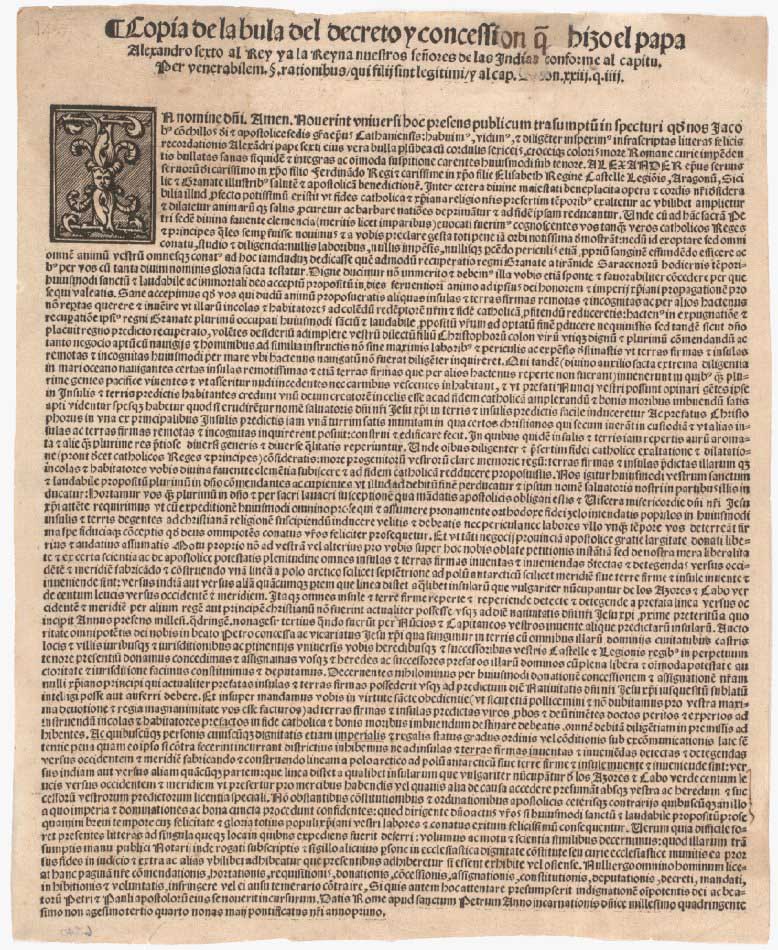Inter Caetera
The Papal Bull Inter Caetera of May 4, 1493
Introduced and translated by Sebastian Modrow and Melissa Smith
⤓ Download and Read the new translation as a PDF

Introduction
Christopher Columbus returned from his first voyage on March 4, 1493, landing first at the mouth of the Tagus River close to Lisbon, Portugal. He informed the Portuguese authorities of his arrival and met with King John II before continuing on to the Spanish port of Palos, arriving on March 15. He probably reached the Aragonese court in Barcelona by mid-April.1 While still in Portugal or perhaps while on his way to the Spanish court, Columbus dispatched two letters written in Spanish describing the experiences and findings of his first voyage. One was addressed to his supporter and benefactor Luis de Santángel, Escribano de Racion at the Court of Aragon, and the other to the Spanish monarchs, Isabella and Ferdinand. The letter was soon published (between late March and mid-April, most likely in Barcelona), and a Latin version (purportedly translated on April 29) was printed in Rome.2 While Pope Alexander VI, a Spaniard himself, would have had no issues reading the Spanish version, it is likely that it was the Latin translation that was brought to his attention.
While clearly informed by Columbus’s letter and whatever additional information the Spanish monarchs may have provided, Inter Caetera must first and foremost be seen and understood in the context of a series of papal bulls that reacted to the development of Portuguese and Spanish ‘discoveries,’ first along and off the western coast of Africa but later also with regard to the trans- Atlantic route to ‘India.’ The bull Inter Caetera was not even the first with this name. In 1456, Calixtus III, an uncle of the later pope Alexander VI, had issued a bull the main text of which, after the introductory protocol, began with these words (and a bull is usually named after these opening words). Going beyond the geographical scope of its predecessors Dum Diversas (1452) and Romanus Pontifex (1454), both issued by Pope Nicholas V, the 1456 Inter Caetera bull granted Portugal the right of conquest
“‘as far as the Indies’ (usque ad Indos) - that is, Asia –,” as William Henry Scott reminds us, “and threatened any challengers with excommunication. Similarly, after the Treaty of Alcobas ended Spain’s unsuccessful attempt to do so, Sixto IV’s Aeterni Regis of 1481 granted what had already been decided by naval artillery – Portuguese occupation of Atlantic islands like the Azores, Madeiras and Cape Verdes – and sanctioned all future such discoveries ‘in the Ocean Seas’ (in mari oceano), the waters believed to surround the Eurasian land mass. The question of eastern and western sea routes had not yet become an issue. European cosmographers, unaware of the existence of the American continents, did not doubt that the same waters washed the eastern shores of Asia and the west coast of Europe. Thus when Ferdinand V sent Columbus into those waters to reach the Indies, he was breaking the oath he had sworn at Alcobas and defying papal excommunication.”3
Alexander VI’s Inter Caetera bull, the name of which was hardly chosen by accident, addressed and amended, therefore, an established framework of papal grants in a changed geopolitical reality, as Spain seemed to have discovered the western route to Asia. Its first version was ostensibly written on May 3, but it had in fact entered the Vatican registry (Regesta Vaticana) by the end of April 1493.4 In order to avoid a violation of the stipulations of Aeterni Regis and the Treaty of Alcobas, which could have led to an open confrontation with Portugal, the pope granted the Spanish monarchs ‘only’ those lands that at the time of their discovery were not ruled by a Christian prince and made it very clear that “no right conferred on any Christian prince is hereby to be understood as withdrawn or to be withdrawn.”5 This could hardly have been satisfactory to the crowns of Castile and Aragon, who, informed already about the results of Columbus’s first voyage, feared the Portuguese would enter a ‘discovery’ race in the west for which, in 1493, they were far better positioned than Castile and Aragon.
Alexander’s second version of Inter Caetera, dated only one day later (May 4) but written probably months after the first version, reproduces in large part the same text as the May 3 version but with one (twice mentioned) addition: The May 4 bull establishes a demarcation line for the spheres of the Spanish and Portuguese interests from the North to the South Pole “one hundred leagues to the west and south of any of the islands that are usually called the Azores and Cape Verde.”
The Latin text was established using the digitized original6 as well as Davenport’s edition.7 Mostly in concordance with Davenport but in contrast to the edition of Levy Maria Jordão,8 it reproduces the original’s 15th-century Latin spelling as well as its capitalizations and only rarely disagrees with Davenport’s readings, as in its retention of the text’s negocio in contrast to Davenport’s hypercorrect negotio. However, while Davenport for the sake of greater readability dissolved all abbreviations, for this edition, the abbreviations are expanded by including the omitted letters in square brackets. We are aware that this might slightly decrease the readability of the edited Latin text but hope that it will increase and encourage the use of the original document, which in Davenport’s day was reproducible only as a black and white facsimile, in contrast to today’s high resolution digital surrogates. To further encourage the use of this edition alongside the (digitized) original, we also indicated line breaks with a slash where they occur in the document, which will hopefully help readers navigate the text in the original bull.
Translation differences between this new translation and Davenport’s occur more often in tone than in content. Of the latter, the most important is probably this: When discussing the religious aims of these expeditions and conquests, the pope states that it is a priority for him that those barbarian peoples ad fidem ipsam reducantur, which Davenport translates as being “brought to the faith itself.” However, since the semantics of the verb reducere carry an element of ‘back/return’ due to its prefix ‘re-’, we decided to translate the clause as “bringing them back to the faith”, the implications of which Sebastian Modrow is exploring in a separate piece of scholarship. With slight variations, this papal request to return the local populations to the true faith occurs multiple times throughout the bull.
⤓ Download the new translation as a PDF
Footnotes
Details
Citation
Alexander VI. 2022. “Inter Caetera.” Translated by Sebastian Modrow and Melissa Smith. Indigenous Values Initiative. Doctrine of Discovery Project. https://doctrineofdiscovery.org/inter-caetera/.
Citation Files
-
William H. Scott, “Demythologizing the Papal Bull ‘Inter Caetera,’” Philippine Studies 35, no. 3 (1987), 350 and 352. ↩
-
Elizabeth M. Willingham, The Mythical Indies and Columbus’s Apocalyptic Letter: Imagining the Americas in the Late Middle Ages (Eastbourne, UK: Sussex Academic Press, 2015), 17. The 1893 Quaritch facsimile of the folio edition of the Spanish letter including a transcription is available through Google Books, https://books.google.com/books?id=NPXCTYxu-R4C&pg=RA2-PA1#v=onepage&q&f=false, as is the 1893 Quaritch facsimile of the Latin letter, https://books.google.com/books?id=9s0tAAAAYAAJ&pg=PP1#v=onepage&q&f=false. The Gilder Lehrman Institute of American History provides an English translation of the Latin letter, https://www.gilderlehrman.org/sites/default/files/inline-pdfs/t-01427.pdf. ↩
-
Scott, “Demythologizing,” 350. ↩
-
Scott, “Demythologizing,” 352. ↩
-
European Treaties Bearing on the History of the United States and its Dependencies. ed. Frances G. Davenport, (Carnegie Institution of Washington: Washington, DC, 1917), 56. ↩
-
“Bulla del Papa Alexandro VI dada el año 1493, en que concede a los Reyes Cathólicos y sus sucesores todo lo que ganaren y conquistaren en las Indias no estando ocupado por otros”. 1493-05-04 , Roma; MP-BULAS_BREVES,4, Archivo General de Indias, Sevilla, Spain, http://pares.mcu.es/ParesBusquedas20/catalogo/description/17163?nm. ↩
-
Davenport, European Treaties, 72-75. ↩
-
Levy Maria Jordão, ed., Bullarium Patronatus Portugalliae Regum in Ecclesiis Africae, Asiae Atque Oceaniae: Bullas, Brevia, Epistolas, Decreta Actaque Sanctae Sedis Ab Alexandro III Ad Hoc Usque Tempus Amplectens, Tomus I (Lisbon: Ex Typographia nationali, 1868). ↩
SUGGESTED CITATION
Indigenous Values Initiative, "Inter Caetera," translated by Sebastian Modrow and Melissa Smith, Doctrine of Discovery Project (13 June 2022), https://doctrineofdiscovery.org/inter-caetera/.
Download citation formats:
Share on
X Facebook LinkedIn BlueskyDonate today!
Open Access educational resources cost money to produce. Please join the growing number of people supporting The Doctrine of Discovery so we can sustain this work. Please give today.

